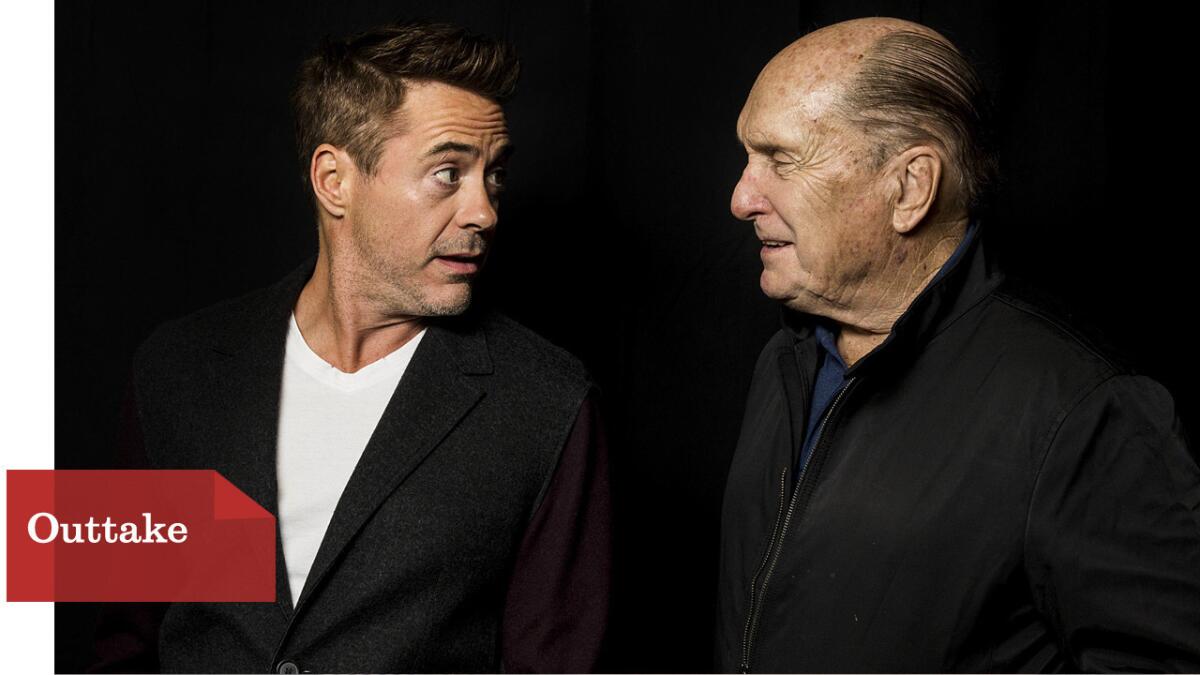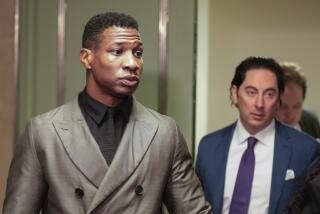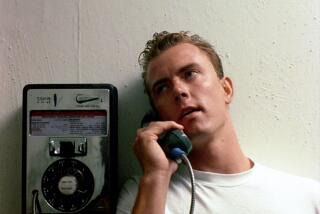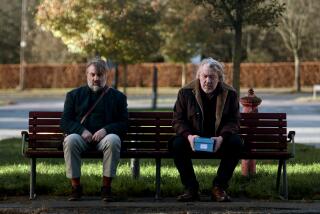Screening Series: ‘The Judge’ stars, director and producer reexamine the evidence

Playing a slick attorney in “The Judge,” Robert Downey Jr. traded Iron Man’s armor for more tailored threads. The movie, which opened the Toronto International Film Festival in September, is a crowd-pleaser — funny, suspenseful and sometimes quite moving — anchored by a number of fine performances, particularly Downey and Robert Duvall, who play Hank and Judge Joseph Palmer, an estranged son and father working things out the hard way. We spoke to the actors, director David Dobkin and producer Susan Downey at a recent Envelope Screening Series event. Here are excerpts from the conversation.
The idea for this movie, David, started with your relationship with your mother and caring for her when she was sick. You had a complex relationship with her?
Dobkin: Very complicated. I was the kid always getting in trouble and getting arrested, and my father was the really brilliant attorney who was cross-examining me in the kitchen at night. But my mother somehow was the one that really delivered justice, and it was tough, so when she got older and she got ill, I found myself in the position of parenting my parent, and it was something that I was not really prepared for. After she passed, I started to sketch out a story that was the seed of what became the movie. But later on, everybody kind of participated. It became a kind of universal story about family and redemption and salvation and how do you as an adult reenter your family and heal the wounds.
I understand you were initially not jumping up and down to sign on, Robert?
Duvall: Well, you have to think about things and it’s a commitment, and once you commit, you jump in. Once I decided it was right, we talked. I met with David, and when it became a reality you just go to work each day and do the best you can on a daily basis. It’s simple.
Dobkin: I just have to commend Bobby because a lot of times you meet with an actor before a movie and they’re like this scene and this scene and this scene are issues for me. And you explain as a director why you think those are really important to stay in the movie. And everyone nods their heads and you leave and then, over the next six months, you’re slowly being talked out of it. Bobby, once he committed to the movie, and those were really scary scenes to play, he just attacked it like a pro. I mean like an old-school classic actor who said I committed to this and I’m going to give it everything I have.
What were those scenes?
Robert Downey Jr.: The bathroom scene …
Dobkin: We did a really kind of classic approach, as if you were breaking down Arthur Miller or Eugene O’Neill. We took apart the script and we talked about it and we talked about ourselves, our families, and we did some improvisations. And through that experience of spending time together, they started to know each other and their behavior started to become consistent no matter what scene or what you were doing, and that’s what happens with a family, is you end up in these patterns of arguments and behavior that show up no matter what happens. There were some beautiful scenes in the movie that never made it in, honestly. You can’t exceed your welcome, and stuff had to go. I mean, you were rather brave, Robert. There’s a couple scenes that I showed you that I was like, “This is going to go,” and they were great performances.
Downey: Yeah, whatever.
Dobkin: And that’s exactly what he said.
Downey: I’ll put them on my reel.
You mentioned tough scenes. The kitchen argument is one, obviously. It’s almost like you’re trying to put him on trial.
Downey: There was this sequence of scenes — down in the cellar with the home movies and that kicks this off, and then the judge going outside and me chasing him. Those were kind of like I tried to put him on the stand and he essentially wins the argument. I can’t get a confession out of him, you know.
Duvall: It’s interesting because scenes like that, you know, the really great scenes working with him, it was terrific in the kitchen and other ones as well. You stay within the confines of your [character’s] temperament. Something way in the back of your mind without being conscious checks the fact that you don’t go overboard.
I understand, David, that he added a line in that argument scene that was very key.
Dobkin: Bobby? Oh, yeah. He came over to me and said, “I feel like I would say something about him that, you know, ‘We waited quietly.’” It was maybe the most important line that was somehow not written. And he gave that performance where he says, “We all waited for you quietly, but you never came.” It was just heartbreaking. [To Duvall] You saw it. Your instincts took you there.
Duvall: Yeah, those kind of things, you surprise yourself. You trick yourself at that moment.
Susan Downey: Well, also Downey added the line, “I needed you.” That was a cool addition too that made it into the cut. We never went into the courtroom in the original draft, but the reason we went there is because it’s the payoff to the kitchen scene. There was this concept that if Hank could have the opportunity to put the Judge on the stand, a guy who was not gonna lie under oath, and ask him questions. So the first attempt to really let that emotion out was in the kitchen. Then we had to go to the courtroom.
I remember picturing the moment in the courtroom between them when he’s asking about the past — it’s so crazy to think about it now having seen it done properly — but in the bad version in my head, that was a screaming moment in the courtroom. And when they did it, they did it so quietly and with that sort of single tear and it was like wow, OK, that’s how you do it, which allowed the kitchen scene to be a lot bigger.
How much time did you spend on that kitchen scene? Was that ...
Dobkin: That scene was done in half a day.
Robert Downey Jr.: Yeah, all the big crazy stress on it for weeks, it just happened really quickly and efficiently. David is very organized; he’s a perfect balance of a director. He makes the stress-inducing parts of a shoot very, very manageable. We just had this amazing time telling this difficult, evocative story. I mean, he would be passing weird notes around, and Billy Bob [Thornton] would be doing “Sling Blade.”
Duvall: Notes right before a big emotional scene. I can’t tell you what the notes said, but they were nice notes, kind of interesting.
Robert Downey Jr.: You’re doing all these heavy scenes, but it’s the one where the Judge is having a bad night after he’s had the chemo treatment that day. Hank goes in and, to try to distract him, says, “Who’s the best lawyer you ever saw?” And by the end of the scene he realizes that his dad has named him after this lawyer who didn’t care what the ramifications were of defending someone because that’s your job — he was speaking to the type of person he wanted Hank to be by naming him that. To me, that scene is almost like a dream where Hank gets information about the keys to his own salvation from his pops.
Robert, as a producer on this, you’ve seen this movie, like, 20 times?
Robert Downey Jr.: Yeah.
And every time you watch it you cry?
Robert Downey Jr.: I do.
Duvall: Really?
Susan Downey: Yeah.
How many times have you seen it, Bobby?
Duvall: Twice.
Did you cry?
Duvall: No, I get moved. I didn’t cry, but I got moved. Same thing.
Robert Downey Jr.: I cried enough for both of us.
Duvall: I cried when they paid me.
More to Read
From the Oscars to the Emmys.
Get the Envelope newsletter for exclusive awards season coverage, behind-the-scenes stories from the Envelope podcast and columnist Glenn Whipp’s must-read analysis.
You may occasionally receive promotional content from the Los Angeles Times.







